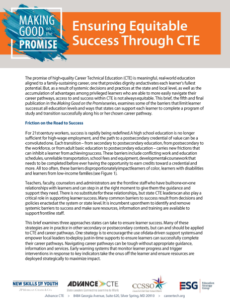 Financial expenses, work commitments, developmental education and healthcare needs are some of the most common barriers to success for community college students, according to a survey by RISC. To minimize these barriers and bolster postsecondary credential attainment rates, Southwestern Community College (SCC) in Sylva, North Carolina has awarded 129 mini grants to help students address needs such as housing, transportation and educational expenses.
Financial expenses, work commitments, developmental education and healthcare needs are some of the most common barriers to success for community college students, according to a survey by RISC. To minimize these barriers and bolster postsecondary credential attainment rates, Southwestern Community College (SCC) in Sylva, North Carolina has awarded 129 mini grants to help students address needs such as housing, transportation and educational expenses.
The grants were issued as part of North Carolina’s Finish Line Grants program, which was started in 2018 using governor’s discretionary funds through the Workforce Innovation and Opportunity Act (WIOA). The program is administered by local workforce development boards in partnership with nearby community colleges and provides up to $1,000 per semester per student to address unexpected financial emergencies.
The Finish Line Grant program, while relatively new, demonstrates the role states can play in removing barriers to success and supporting each learner — at the secondary, postsecondary or adult level — to achieve a credential of value and access an in-demand occupation with family sustaining wages.
Advance CTE’s latest report, the fifth and final installment in the Making Good on the Promise series, explores other approaches states can take to ensure learner success through Career Technical Education (CTE), including:
- Using data-driven support systems to meet learners’ needs: To increase postsecondary credential attainment, some school districts and institutions of higher education have started deploying their data to drive a comprehensive, student-centered support system. Using a method known as predictive analytics, institutions analyze past data on the performance and behaviors of their student body to identify patterns that are correlated with success. They then use this information to identify key indicators — such as absenteeism or low grades in core academic courses — and provide proactive supports to ensure learners can make progress towards graduation or a postsecondary credential.
- Providing integrated support services to secure wellness, academic preparation and financial stability: Like North Carolina, states can support equitable success in CTE by minimizing common barriers — such as health, academic and financial barriers — that learners encounter along their pathways. Expanding and fully funding integrated support services at both the secondary and postsecondary level can help reduce the burden on learners and ensure they can access the help they need to be successful.
- Creating the enabling conditions for successful transitions: While completing a program or earning a sought-after credential or degree is important and should be the objective of any pathway, the ultimate measure of success is whether learners transition successfully into the next step of their career pathway, be it postsecondary education, an apprenticeship, employment or other opportunity of choice. States can support successful transitions to postsecondary education by ensuring early postsecondary opportunities such as dual or concurrent enrollment are accessible and equitable. They can also support transitions to the workforce by helping learners develop their occupational identity and expand their social networks through early career exposure and meaningful work-based learning connected to their career pathways.
Throughout the Making Good on the Promise series, Advance CTE has explored state strategies to identify equity gaps, rebuild trust among historically marginalized populations, and expand access to high-quality CTE opportunities.
But the work does not stop there. State leaders have a responsibility to ensure each learner is not only able to access CTE, but also feel welcome, fully participate in and successfully complete their career pathway. This means constantly monitoring learner progress and creating the conditions that are conducive for learner success. Making Good on the Promise: Ensuring Equitable Success through CTE aims to provide a roadmap for states to learn from promising practices and develop their own plans for achieving equity.
Austin Estes, Senior Policy Associate

